Patient Follow Up Letter
Dear [Patient's Name],
RE: Follow-Up on Your Recent Medical Appointment
I hope this letter finds you in good health and high spirits. I am writing to provide you with a follow-up on your recent medical appointment at [Your Organization]. We would like to express our sincere gratitude for choosing our healthcare facility for your medical needs and for placing your trust in our team.
During your visit on [Date], you met with [Doctor's Name] and received a thorough evaluation and treatment for [Briefly mention the reason for the visit, such as a specific condition or symptoms]. The purpose of this letter is to summarize the key points discussed during your appointment and provide you with additional information that may be relevant to your ongoing care.
[Summarize the key findings from the appointment, including any diagnoses, test results, or treatment recommendations. Be sure to use clear and concise language to ensure the patient understands the information.]
Based on the evaluation conducted during your visit, [Doctor's Name] has recommended the following:
1. [Specify any prescribed medications, including dosage instructions, frequency, and duration.]
2. [Outline any lifestyle modifications or self-care instructions, if applicable.]
3. [Mention any referrals to other specialists or healthcare providers, if necessary.]
We strongly encourage you to follow the prescribed treatment plan and adhere to any lifestyle modifications suggested by your healthcare provider. It is essential to prioritize your well-being and take the necessary steps to promote your recovery and overall health.
If you have any questions, concerns, or need further clarification about your condition, treatment plan, or any other medical aspect, please do not hesitate to contact our office at [Phone Number]. Our dedicated staff will be more than happy to assist you and address any queries you may have.
Additionally, we would like to remind you of your upcoming appointments, if applicable. The next scheduled appointment is on [Date] at [Time]. Please make the necessary arrangements to ensure your availability.
Maintaining open communication with your healthcare provider is vital to ensuring the success of your treatment and optimizing your health outcomes. We encourage you to keep us updated on your progress or any changes in your condition between appointments.
Once again, we appreciate the opportunity to provide you with medical care, and we look forward to supporting you throughout your healthcare journey. We wish you continued good health and a speedy recovery.
Sincerely,
[Your Name]
[Your Title/Position]
[Your Organization]
Routine Patient Follow-Up Letter
Dear [Patient Name],
We hope this message finds you well. This is a follow-up regarding your recent visit to [Clinic/Hospital Name] on [Date].
Please ensure you are following the prescribed treatment plan and medication schedule. If you experience any new symptoms or have questions regarding your health, do not hesitate to contact us or schedule your next appointment.
We look forward to seeing you at your next scheduled check-up.
Best regards,
[Doctor/Practitioner Name]
[Clinic/Hospital Name]
[Contact Information]
Post-Treatment Follow-Up Letter
Dear [Patient Name],
Thank you for visiting [Clinic/Hospital Name] for your [Treatment/Procedure] on [Date]. We are following up to monitor your recovery progress.
Please continue adhering to the post-treatment instructions and medications provided. We encourage you to report any unusual symptoms or concerns immediately. Your health and recovery are our priority.
Sincerely,
[Doctor/Practitioner Name]
[Clinic/Hospital Name]
Heartfelt Follow-Up Letter
Dear [Patient Name],
We hope you are feeling better since your visit to [Clinic/Hospital Name]. We understand that recovery can be challenging and want to remind you that we are here to support you every step of the way.
Please reach out if you need advice, adjustments in medication, or simply reassurance. Your well-being is very important to us.
Warm regards,
[Doctor/Practitioner Name]
Quick Digital Follow-Up Message
Hello [Patient Name],
This is a quick check-in following your appointment at [Clinic/Hospital Name] on [Date]. Please let us know if you have any concerns or questions regarding your treatment plan.
Thank you,
[Clinic/Hospital Name]
Specialist Referral Follow-Up Letter
Dear [Patient Name],
Following your recent consultation at [Clinic/Hospital Name], we referred you to [Specialist Name/Specialty]. This letter serves as a follow-up to ensure you have scheduled your appointment and received appropriate care.
Please update us with the specialist’s findings and recommendations. Your health remains our top priority.
Sincerely,
[Doctor/Practitioner Name]
[Clinic/Hospital Name]
Lab Result Follow-Up Letter
Dear [Patient Name],
We are writing to inform you that your recent lab results from [Date] are available. Please review the results with our office to discuss any necessary actions or treatment adjustments.
Timely follow-up ensures optimal care and management of your health conditions.
Best regards,
[Doctor/Practitioner Name]
[Clinic/Hospital Name]
What a Patient Follow-Up Letter Is and Why It’s Important
A Patient Follow-Up Letter is a written communication from a healthcare provider to a patient after a visit, treatment, or procedure.
Purpose:
- Ensure continuity of care and treatment adherence
- Monitor patient recovery and address concerns
- Provide reminders for appointments, medications, or tests
- Maintain a professional and empathetic relationship with patients
Who Should Send a Patient Follow-Up Letter
- Primary care physicians
- Specialists involved in the patient’s care
- Clinic or hospital administrative staff under medical guidance
- Healthcare providers authorized to communicate patient health information
Whom the Letter Should Be Addressed To
- The patient receiving care or treatment
- In cases of minors, the parent or legal guardian
- Authorized family members if the patient has consented
When to Send a Patient Follow-Up Letter
- After routine check-ups to confirm patient well-being
- Following medical procedures, surgeries, or treatments
- Upon receiving lab or diagnostic results
- After referrals to specialists or additional care
- Any instance requiring ongoing monitoring of patient health
How to Write and Send a Patient Follow-Up Letter
- Review the patient’s medical record and recent visit details
- Identify key points: treatment updates, instructions, and appointments
- Choose tone: professional, empathetic, and supportive
- Include clear instructions or reminders for next steps
- Send via email for digital delivery or print for formal postal delivery
Elements and Structure of a Patient Follow-Up Letter
- Salutation addressing the patient directly
- Opening paragraph acknowledging recent visit or treatment
- Body with:
- Summary of treatment or procedure
- Recommendations and next steps
- Monitoring instructions or medication reminders
- Closing paragraph offering assistance or contact information
- Signature of healthcare provider and clinic/hospital details
Formatting Guidelines for Patient Follow-Up Letters
- Length: typically one page or concise email
- Tone: professional, caring, and empathetic
- Style: clear, structured, and easy to read
- Wording: simple, patient-friendly language avoiding complex medical jargon
- Mode: email, letter, or patient portal message based on context
Requirements and Prerequisites Before Sending
- Complete and accurate medical records for the patient
- Review of recent visit, treatment, or lab results
- Authorized consent to communicate medical information
- Clear instructions from the healthcare provider on what needs to be communicated
Common Mistakes to Avoid
- Using overly technical language that patients may not understand
- Forgetting to include follow-up instructions or appointment reminders
- Sending letters too late, affecting continuity of care
- Sharing confidential information without proper authorization
Tips and Best Practices for Patient Follow-Up Letters
- Personalize the letter to include patient-specific details
- Use clear and empathetic language
- Highlight key actions or next steps clearly
- Encourage patients to ask questions or reach out if needed
- Maintain confidentiality and comply with healthcare regulations
Frequently Asked Questions About Patient Follow-Up Letters
Q: Are follow-up letters required for all patients?
A: Not mandatory, but highly recommended to ensure proper care and patient engagement.
Q: Can follow-up letters include lab results?
A: Yes, but ensure results are explained in understandable terms and include contact info for questions.
Q: How soon should follow-up letters be sent?
A: Typically within 1–3 days after visits, or as soon as results or next steps are available.
Q: Can digital follow-up messages replace printed letters?
A: Yes, using email or patient portals is effective and faster, provided confidentiality is maintained.
After Sending a Patient Follow-Up Letter
- Confirm receipt if necessary, especially for critical instructions
- Record the communication in patient files
- Be prepared to respond to patient questions or concerns
- Schedule any necessary follow-up appointments or tests
Pros and Cons of Sending Patient Follow-Up Letters
Pros:
- Strengthens patient-provider communication and trust
- Improves adherence to treatment plans
- Provides documentation for legal and clinical purposes
Cons:
- Requires additional time and administrative effort
- Risk of miscommunication if instructions are unclear
- Must ensure patient confidentiality is strictly maintained
Compare and Contrast with Other Follow-Up Methods
- Compared to phone calls: letters provide a written record and are less intrusive
- Compared to text or portal messages: letters can convey detailed instructions more clearly
- Alternative: combined approach using both written letters and digital reminders for efficiency

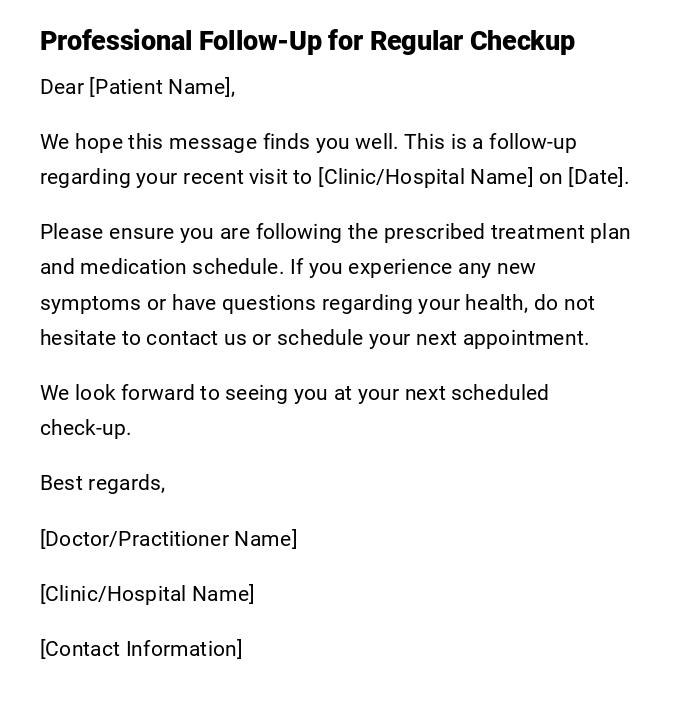
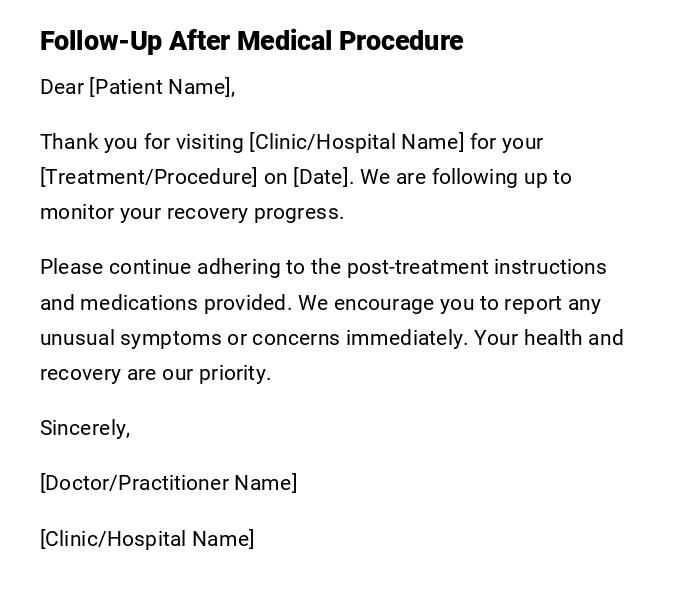
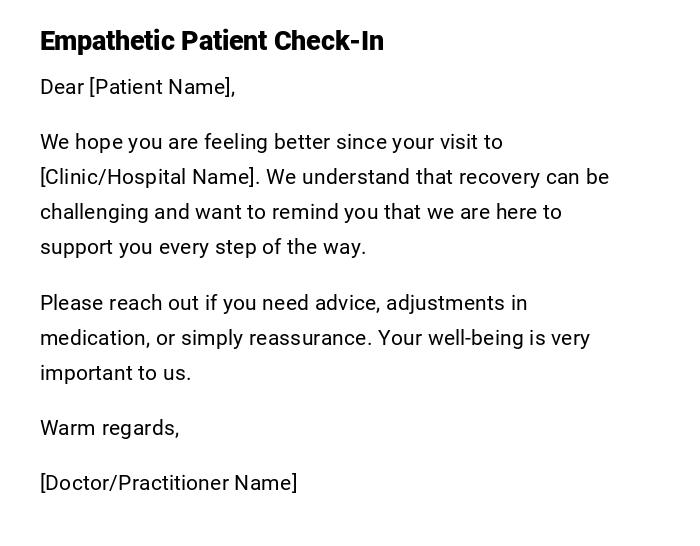
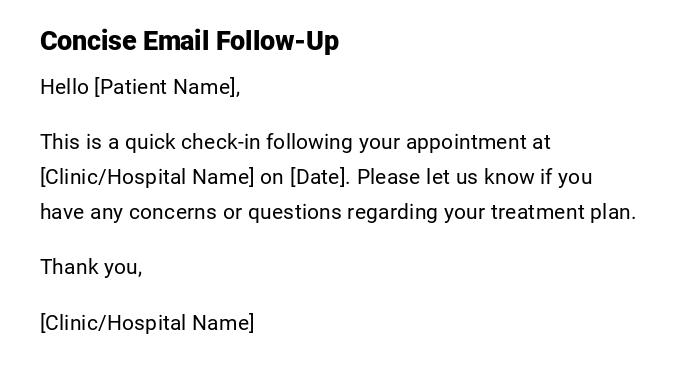
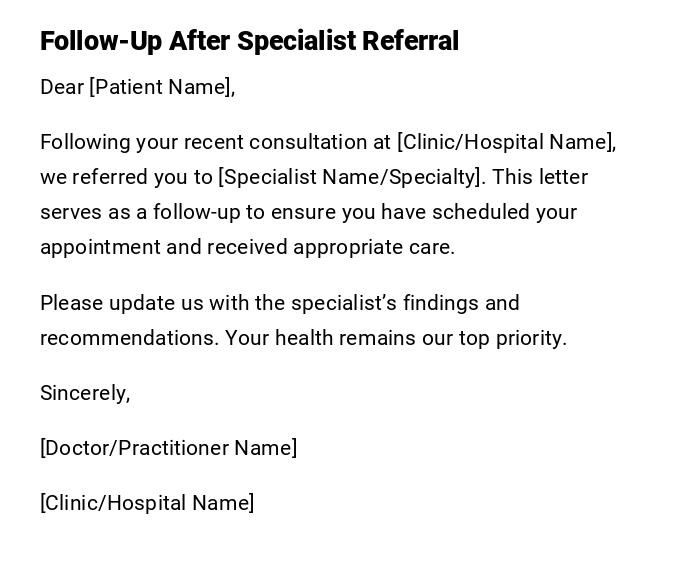
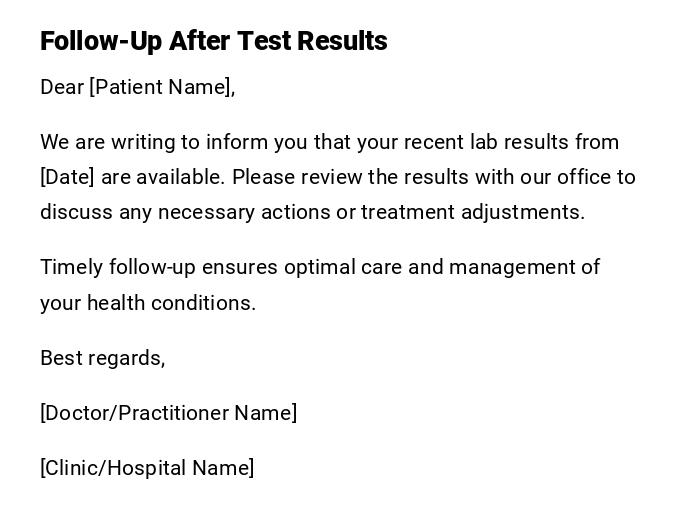

 Download Word Doc
Download Word Doc
 Download PDF
Download PDF